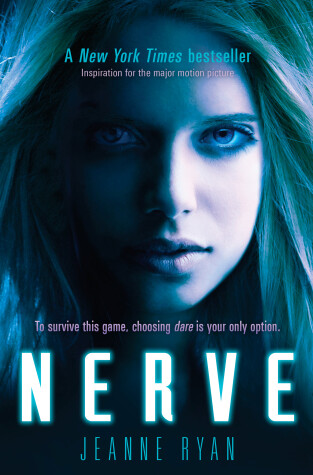
Amber (The Literary Phoenix)
Written on Aug 2, 2019
There were some definite issues with Nerve. One of the things I’m trying to do in judging main characters is to step back and remind myself: just because I don’t agree with it, or because I don’t like it… doesn’t mean it’s wrong or badly done. It was a line I had to feed myself a lot while listening to Vee. As a character, she flip-flopped a lot between “oh no, I’m just too shy and scared” to “well actually I have to because OMG FREE MAKEOVER” and it was just… really hard for me to read. She felt like the worst stereotype of a teenage girl. The author tried to round her out by giving her a dark secret, but I didn’t feel it worked. The secret in itself was all a big misunderstanding, but it’s the sort of situation I felt it was nearly impossible to have happen “accidentally”. It all just sort of fell apart.
To be completely honest, I was predisposed to dislike Vee from the beginning, through no fault of her own. The narrator of this audiobook, Caitlin Davies, is one I’ve heard a couple times before. The first, in Anatomy of a Misfit, was early last year and I abhorred the book to my bones. I had issues with the narrator, but it was overshadowed by the books. The second, Talon, I actually DNF’d because of the narrator. Caitlin Davies speaks with an emphasis that I can only relate to a valley girl stereotype. From the information in the book, this tone actually works with Vee… but it does not win her any points with me.
Vee isn’t the only flat, annoying character. She constantly makes out her best friend, Sydney, as a diva, but Syd is nothing but nice. People keep telling Vee that Ian is the “bad boy” but there’s never an indication of that. Tommy is a stereotypical nerd, which includes hacking and running face recognition software. Ty and Micki are just… insanely flat villains. While Ty is an asshole supreme, Micki stands out to me more because she is not only unnecessary cruel, but it’s all been tied into a stereotypical goth character – complete with safety pins in her chin. Which are mentioned several times. There are also a lot of sexist comments throughout the book, especially from Matthew (Vee’s crush at the beginning of the book) and Ty (who actually told Ian to “control your woman” and made me want to scream).
Some reviews are insisting that the characters are like this on purpose, because on greedy, selfish people would play Nerve. I don’t agree with that sentiment, but I get their perspective.
Actually, the one thing I did like was Nerve. Think about it. A game app that allows you to win tailored prizes for performing dares. Today’s social media world would eat this up if it were real. It’s such a cool, creative idea and has a lot of promise. Unfortunately, I didn’t feel the execution followed through.
A lot of these are harmless dares, albeit embarrassing and a bit rude. Other dares are when you pretend to be a prostitute or when you choose someone to shoot at. The prizes, too, failed to impress me. They played on Vee’s greed and her’s at least felt like they were escalating. Ian were the same thing in different formats over and over. While I can infer the source of information used to inspire Vee’s prizes, Ian’s make no sense. Jeanne Ryan wanted to give the people at Nerve a feel of omniscience, but information gets fed in somehow. Going deeper into Nerve itself would have made this a more interesting book.
Also consequences. Consequences would have been great. I found the fallout after the game to be entirely unconvincing.
I kept listening to Nerve because I was interested in the concept and wanted to see if it escalated. I’d say in some ways it did, but not enough to make me excited to read more. The character were so unimpressive and the idea didn’t feel fleshed out enough to me to take on the life it could have. Some of the language was really unsettling, and honest? Vee just cried too much. I’m still here to watch the movie, but I think the book was a bit of a bummer.



